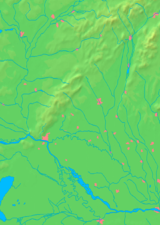Dunaszerdahely
| Dunajská Streda | ||
| Dunaszerdahely | ||
| Town | ||
|
|
||
| Country | Slovakia | |
|---|---|---|
| Region | Trnava | |
| District | Dunajská Streda | |
| Tourism region | Podunajsko | |
| Elevation | 118 m (387 ft) | |
| Coordinates | 47°59′40″N 17°37′10″E / 47.99444°N 17.61944°ECoordinates: 47°59′40″N 17°37′10″E / 47.99444°N 17.61944°E | |
| Area | 31.451 km2 (12 sq mi) | |
| Population | 22,553 (2014-12-31) | |
| Density | 717/km2 (1,857/sq mi) | |
| First mentioned | 1250 | |
| Mayor | Zoltán Hájos | |
| Timezone | CET (UTC+1) | |
| - summer (DST) | CEST (UTC+2) | |
| Postal code | 929 01 | |
| Phone prefix | 421-31 | |
| Car plate | DS | |
| Statistics: MOŠ/MIS | ||
| Website: http://www.dunstreda.sk/ | ||
Dunajská Streda (Slovak: Dunajská Streda, pronounced [ˈdunajskaː ˈstreda] (![]() listen); Hungarian: Dunaszerdahely; German: Niedermarkt; Hebrew: סרדאהלי) is a town in southern Slovakia (Trnavský kraj). Dunajská Streda is the most important town of the Žitný ostrov area. It has a Hungarian ethnic majority and its population is 22,477 (2011 census)
listen); Hungarian: Dunaszerdahely; German: Niedermarkt; Hebrew: סרדאהלי) is a town in southern Slovakia (Trnavský kraj). Dunajská Streda is the most important town of the Žitný ostrov area. It has a Hungarian ethnic majority and its population is 22,477 (2011 census)
The name of Syridahel was first mentioned in 1256. Other early orthographic forms of the name were Zeredahely (1270) and Zredahel (1358). Szerdahely means "Wednesday (market)place" in Hungarian and it indicates the town had the privilege to hold a market on Wednesdays (although it was later changed to Fridays). The word szerda itself has Slavic roots; the word streda means Wednesday in Slovak, with related words existing in other Slavic languages, as it is the middle (stred) day in the week. The attribute Duna- (Dunajská; i.e. Danubian) was added in the 19th century to distinguish it from other towns with similar names (in accordance with the "one town, one name" policy of Austria-Hungary). The German name Niedermarkt means "Lower Market".
...
Wikipedia






